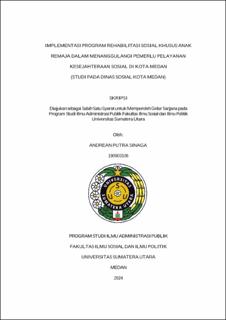| dc.description.abstract | Medan City, as a metropolitan area, faces challenges similar to other major cities in Indonesia, including the significant number of street children and homeless individuals. The phenomenon of street children in Medan remains a complex issue, primarily driven by economic difficulties that force some residents to seek livelihoods on the streets. To address this, the Medan city government enacted Regional Regulation No. 6 of 2003, which prohibits vagrancy, begging, and prostitution.
This research analyzes the implementation of social rehabilitation policies specifically for teenagers in addressing the need for social welfare services in Medan City, focusing on the Medan City Social Service. Using a qualitative descriptive research method, data were collected through interviews, observations, and documentation. The analysis employed Smith's (1973) policy implementation theory, which examines four indicators: idealized policy, target groups, implementing organization, and environmental factors.The findings show that the implementation of social rehabilitation policies for teenagers in Medan has been running effectively and aligns with the roles and responsibilities of the Social Service. The program involves five key stages for handling persons in need of social welfare services (PPKS): treatment, assessment, guidance, reunification, and referral to social service homes.
Researchers suggest enhancing coordination between the Social Service and local sub-district authorities to raise awareness about the PPKS issue. Improved socialization efforts are critical to addressing this problem. Additionally, there is an urgent need for the Medan City Social Service to establish a proper social protection house, as the current shelter facilities are inadequate. Stricter control measures are also recommended for managing PPKS, particularly in the event of future raids. By strengthening these efforts, the social welfare challenges in Medan can be more effectively addressed, ensuring better outcomes for vulnerable populations. | en_US |


